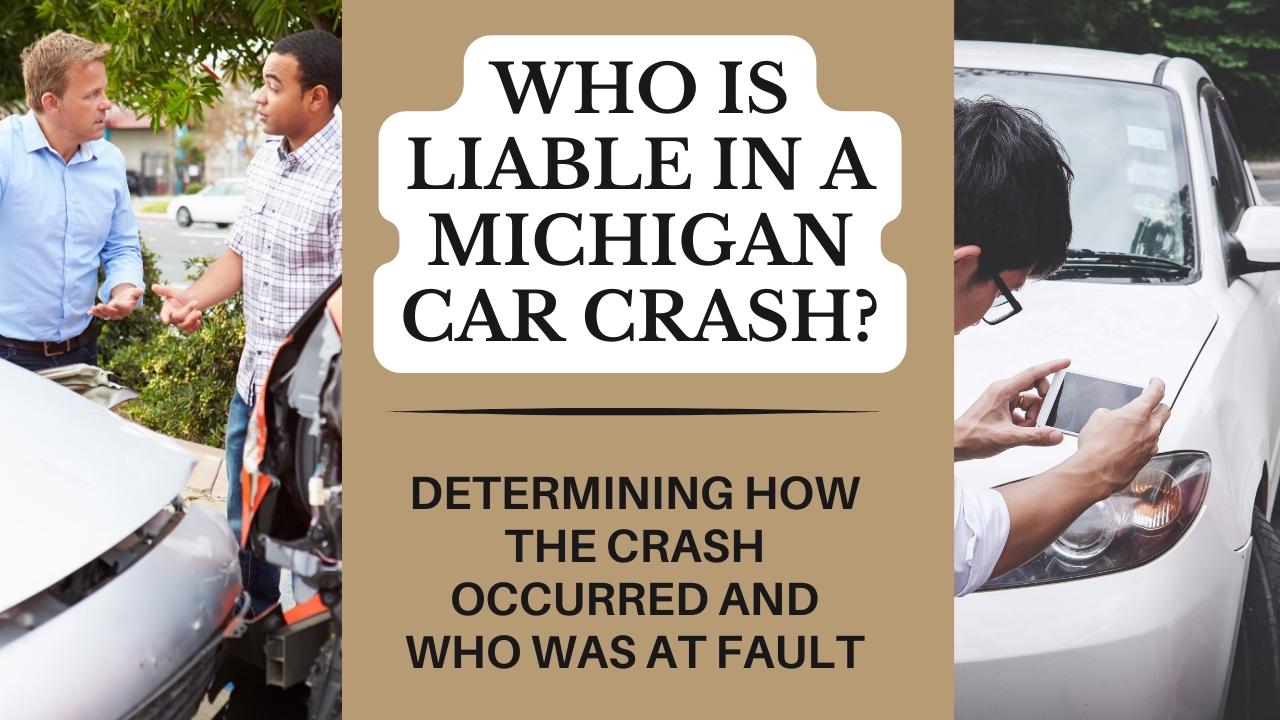Determining Who’s At-Fault in a Michigan Car Crash

Car accidents can disrupt lives in an instant, leaving victims with not only physical injuries but also legal complexities to unravel. As a dedicated plaintiff personal injury law firm, this blog will attempt to shed light on the intricate world of determining who’s at-fault in a Michigan car crash. We’ll dive deep into the legal implications for at-fault drivers, the power of the civil court in seeking justice, and the importance of legal expertise following a car crash in Michigan.
Significance of Fault Determination and Legal Consequences for At-Fault Drivers
When it comes to car accidents, understanding who’s at fault is the glue that holds the legal puzzle together. The concept of fault is a dual-edged sword—it not only establishes criminal liability but also paves the way for civil lawsuits seeking compensation for your pain and suffering damages. At-fault drivers are not only burdened with potential criminal penalties (depending on the circumstances) but can also be held accountable in civil court for the injuries they’ve caused. This dual accountability underscores the urgency of unraveling fault accurately and efficiently.
Michigan No-Fault Insurance Benefits: The Crux of Compensation
Living in Michigan means adhering to an auto no-fault insurance system. This system ensures that, regardless of fault, accident victims are entitled to specific benefits covering medical care and income loss for a limited period. But let’s go beyond the surface—when it comes to claims related to pain, suffering, and long-term income loss, fault becomes pivotal in determining the compensation you’re eligible for, because those claims can be brought against the at-fault driver for compensation. Experienced plaintiff personal injury attorneys can help you understand the requirements needed in these types of claims, and make sure you get the compensation you deserve.
Navigating Comparative Negligence: How At-Fault Drivers Try to Share the Blame
In cases where both drivers share some degree of fault, the concept of comparative negligence comes into play. Comparative negligence recognizes that multiple parties may contribute to an accident, and each party’s degree of fault is taken into consideration. For instance, if one driver ran a stop sign but the other was speeding, the court would evaluate the extent to which each driver’s actions contributed to the accident when determining compensation. There is also a number of different arguments motorists can make back to the plaintiff who’s suing them for being at-fault. Some of those include:
- Sudden Medical Emergency
- Sudden Bad Weather
- Something appeared unexpectedly in the path of the vehicle.
Thus, saying yes, I was negligent, but also a sudden emergency negates my negligence. Just because the determined at-fault driver and their defense team is making this claim, does not mean there’s not a case or argument against those claims. Thus, the process is complicated, and why and knowledgeable attorney is needed to navigate these cases.
Real-Life Scenarios and Case Examples of Comparative Negligence and Sudden Emergency
To better illustrate the complexities of fault determination, let’s explore a couple of case examples:
- Comparative Negligence: A plaintiff is riding in the passenger seat of a motor vehicle, the driver turned left and shouldn’t have, and then, the car got T-boned causing injuries to the plaintiff. The driver had two glasses of wine before driving, which was known by the plaintiff. The passenger then makes a claim against the driver for their negligence in the crash. The defense comes back and argues it was comparatively negligent for the plaintiff to get in the vehicle with somebody who drank two glasses of wine at dinner. Sending the argument of comparative negligence to court.
- Sudden Emergency Defense: In a wrongful death case involving a driver who had a seizure while driving and hit the plaintiff. The defense claimed a sudden medical emergency as a defense, saying he didn’t know he would have a seizure. However, in this particular case, evidence indicated that the driver was on his way to get his prescription medication, and he knew the risks of driving without medication. The plaintiff was able to argue getting behind the wheel without the medication was a negligent decision, weakening the sudden emergency defense.
Blaming Others and Non-Party Fault Notices
Defendants in civil cases may also attempt to shift blame onto other parties, not just the plaintiff. This can lead to the filing of a notice of non-party at fault, where the defendant asserts that someone else played a role in causing the accident. This forces the plaintiff to decide if the other party will be added to the lawsuit. These third parties could include automobile manufacturers (for defects) or even individuals present at the scene. However, the burden of proof lies on the defendant to establish the contribution of the non-party to the accident.
Understanding the Importance of Liability and Determination
Determining fault in car accidents is a multi-faceted process with far-reaching consequences. From criminal liability to civil lawsuits, understanding fault is essential for both individuals involved and the legal system. By comprehending the intricacies of fault determination and seeking legal guidance when needed, individuals can ensure their rights are protected and receive the compensation they deserve after a traumatic car accident.
In the aftermath of a life-altering car accident, securing legal counsel isn’t just wise—it’s essential. Speaking with an experienced plaintiff personal injury lawyer ensures you’re armed with the knowledge, representation, and unwavering dedication needed to navigate the complexities of fault determination. Car accidents should never dictate your life’s trajectory. The road to justice is paved with your rights, your pain, and your rightful compensation. Sinas Dramis Law Firm partner Stephen Sinas explains these topics in an appearence on WLAJ “In the Name of the Law.”
If you or a loved one has been injured in a motor vehicle crash that wasn’t your fault, contact Sinas Dramis Law Firm and request a Free Consultation.

